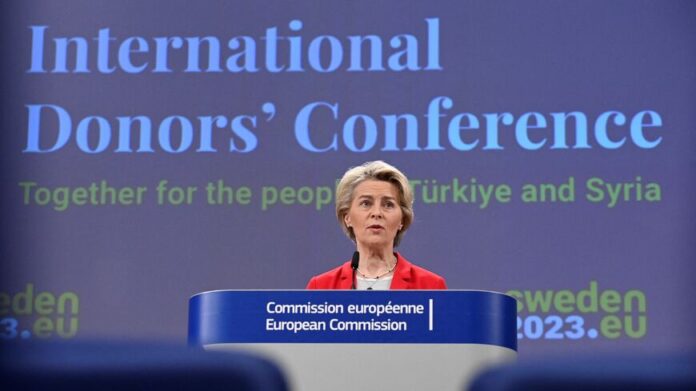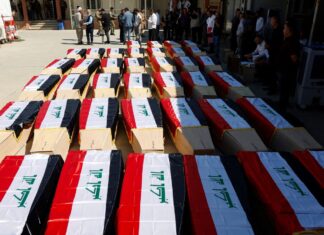By Nazlan Ertan
IZMIR, Turkey (al-Monitor.com) — The International Donors’ Conference in Brussels pledged on Monday nearly $7.5 billion for reconstruction for the earthquake victims in Syria and Turkey, as the death toll reached more than 50,000 in Turkey alone.
Swedish Premier Ulf Kristersson, whose country holds the rotating term presidency of the European Union, said today that the fundraiser has “reached its goal” by providing €6.05 billion ($6.48 billion) in grants and loans for Turkey and €950 million ($1.018 billion) in grants for Syria.
One billion of the aid alone comes directly from the European Commission, pledged by EC President Ursula von der Leyen as she kicked off the EU-sponsored event in Brussels. “I am pleased to announce that the European Commission alone will support Turkey with 1 billion euros ($1.072 billion) for the post-earthquake reconstruction. We also pledge a further package of 108 million euros ($115.7 million) for humanitarian assistance and early recovery in Syria,” von der Leyen told participants that included EU member states, UN institutions, international financing bodies, India, Japan, Azerbaijan, Qatar, Saudi Arabia and the United States.
Six hours later, von der Leyen announced that “Team Europe” — meaning the EC, the European Investment Bank, and the European Reconstruction and Development Bank — had raised 3.6 billion euros ($3.8 billion), half of the total donations. The total sum includes grants, loans or, in the case of Hungary, funding the renovations of a specific church. EU member Cyprus, which is not recognized by Turkey, also attended the conference and pledged 500,000 euros ($533,200) to Turkey and Syria.
Kristersson signaled that Sweden will commit 45 million euros ($48 million) to rehabilitate and reconstruct the two quake-devastated countries. Sweden’s entry to NATO is still blocked by Ankara on the grounds that Stockholm failed to fulfill its promises to address Turkey’s security needs. Turkish President Recep Tayyip Erdogan said last week that his government will send the application of Sweden’s neighbor Finland for ratification to Parliament before the country’s dual elections scheduled for May 14. Asked about Sweden’s NATO membership at the final presser, Turkish Foreign Minister Mevlut Cavusoglu said that Ankara was waiting for concrete steps from Sweden such as preventing the fundraising, recruitment and propaganda activities of groups that Turkey considers terrorists.










